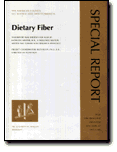-
Dietary fiber is not one substance but many. It is defined as that portion of plant foods that cannot be digested by the nonmicrobial enzymes in the human digestive tract, and it includes a variety of different chemical components.
- The best accepted beneficial effect of dietary fiber is relief of constipation. Wheat bran, in particular, has been shown to be helpful in maintaining regularity.
- Some types of fiber including pectin, guar gum, and the fibers found in oat products, psyllium and legumes reduce blood cholesterol levels to a small but measurable extent. These products may be of value as an adjunct to a cholesterol-lowering diet.
- As a general rule, diets with more fiber-containing foods are believed to be healthier than diets with less fiber. It is uncertain, however, whether the benefit lies in the fiber itself. High-fiber diets are usually moderate in fat and calories and high in vitamins, minerals and nonnutritive phytochemicals. Any or all of these factors may be more important than the diets' fiber content.
- The use of fiber supplements for the purpose of preventing cancer or heart disease is not recommended. Instead, experts urge people to get their fiber from a well-balanced diet that includes grains, legumes, vegetables and fruits.
- Current dietary recommendations for people with diabetes do not call for higher fiber intakes than are recommended for the general public.
- Individuals who are dieting to lose weight often find it helpful to include high-fiber foods in their diets, since these foods are usually low in calories and so help to produce a feeling of fullness. It is uncertain, however, whether fiber has any specific benefits in weight control.
- For individuals who currently consume low-fiber diets, moderate increases in the consumption of fiber-rich foods are generally safe, as long as they are accompanied by increases in fluid intake.
- Fiber-rich foods have a place in children's diets, just as they do in the diets of adults. Excessively high intakes of high-fiber foods, however, may interfere with a child's ability to consume enough calories for normal growth. The Daily Value for fiber that is listed on food labels is too high for children; parents should not attempt to include that much fiber in their children's diets.
|

